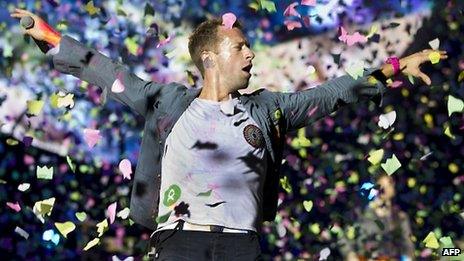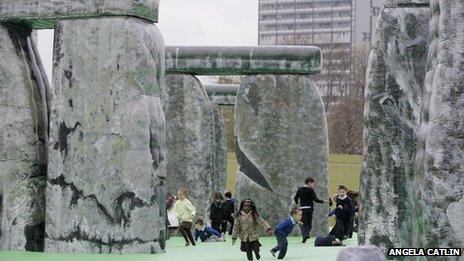Coldplay 'marathon' closes London 2012 Festival
- Published

Coldplay's anthem will be played in bandstands across the country
The festival of arts and culture that has accompanied the Olympic and Paralympic Games ended on Sunday, with a little help from Coldplay.
Hundreds of performers in bandstands across the UK joined in a rendition of Coldplay's Viva La Vida.
The band allowed musicians to play their 2008 single at 14:00 BST in a nationwide musical moment.
The Bandstand Marathon, external was the official finale event of the London 2012 Festival.
The 12-week festival was the climax of the Cultural Olympiad - a programme of arts events that has been running since 2008.
With an overall investment of £55m - including lottery funding - the London 2012 element of the festival began on 21 June and closes on 9 September at the end of the Paralympic Games.
Coldplay, meanwhile, are one of the star acts of the Paralympic Games closing ceremony on Sunday night.
In Scotland this weekend, choreographer Michael Clark has created a large-scale, participatory dance event at Glasgow's music venue Barrowlands to mark the handover to the Glasgow 2014 Commonwealth Games.
Collaboration
Among the London 2012 Festival's most high-profile events were the mass bell-ringing on the opening day of the games, the World Shakespeare Festival, external, the Damien Hirst retrospective at Tate Modern and BBC Radio 1's Hackney Weekend.
But the programme has included thousands of other events and performances across the UK.

Bouncy Stonehenge: Jeremy Deller's Sacrilege was part of the Festival
"We haven't felt in competition with the sport," said London Festival director Ruth Mackenzie, as she previewed the final events this week. "It's felt like the art and athletes have been working together - which is how it was in ancient Greece and it's what we always hoped for."
Anish Kapoor's Orbit - the twisting steel structure that overlooks the Olympic Stadium - has been arguably the most visual symbol of the London 2012 Festival.
"Every time you look at the Olympic television coverage, you see Anish's wonderful sculpture towering above the stadium, not in competition, but as a collective celebration of talent," said Mackenzie.
"It's art back at the heart of the games."
The London 2012 Festival opened in June with five headline events across England, Northern Ireland, Scotland and Wales.
Among them were Scotland's The Big Noise concert in Raploch, Stirling, led by superstar conductor Gustavo Dudamel; and a pyrotechnic show that lit up the shores of Windermere in Cumbria.
At the beginning of August, organisers said more than 12 million people had taken part in the festival, basing their figures on ticket sales, attendance figures and surveys of the UK population.
Approximately 2.9 million joined in with Martin Creed's All The Bells mass bell-ringing session, including then-Culture Secretary Jeremy Hunt, whose bell flew off its handle, narrowly missing another participant.
A further 9.6 million visited free events like the Hackney Weekend and the Tate Modern's oil tanks.
Some 2.5 million people went to paid-for events such as the BBC Proms and the art exhibitions by Hirst and David Hockney.
Updated audience figures will be announced next week, as the focus shifts to the festival's legacy.
One thing under consideration is whether the UK should hold a biennial arts festival.
Cultural Olympiad chairman Tony Hall and Mackenzie have been asked to report back to the Culture Secretary on its feasibility.
"We always said the first thing was to have a great festival and to make sure that people had Olympic and Paralympic magic all round the UK," said Mackenzie.
"The second thing is to make the most of the legacy of that," she added.
"There are measurables like audience numbers and economic impact, but then there are the unmeasurables - such as the memories and new experiences of art they have had."
- Published27 August 2012
- Published14 August 2012
- Published6 August 2012
- Published26 April 2012
- Published21 June 2012